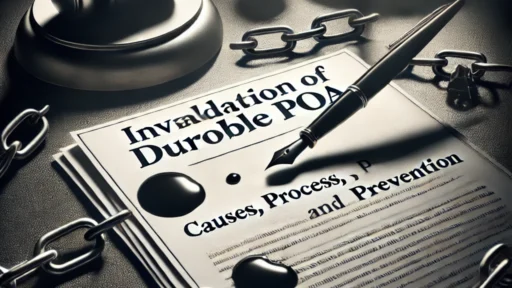Navigating the labyrinth of healthcare decisions can be a daunting experience. That’s where a medical POA comes into play. It’s a legal document that empowers a trusted individual to make health-related decisions on your behalf when you’re unable to do so.
Understanding the nuances of a medical POA is crucial, not only for those drafting one, but also for those entrusted with the responsibility. From the basics to the complexities, this article will provide a comprehensive overview of medical POA.
So, whether you’re considering setting up a medical POA, or you’ve been appointed as an agent, you’re in the right place. Let’s delve into the world of medical POA and unravel its mysteries together.
Understanding Medical Power of Attorney
Grasping the concept of a medical power of attorney (POA) offers clarity about its operation in a healthcare context. Users often explore this topic to make well-informed choices and to function responsibly when holding a medical POA.
Medical POA: Definition and Basic Concept
Medical POA, a term often linked with healthcare, refers to a legal document. It designates a trustworthy person, known as an agent or healthcare proxy, to make medical decisions on behalf of another individual, referred to as the principal. This document comes into effect if the principal becomes mentally incapacitated or unable to communicate their healthcare desires. It plays a crucial role in circumstances like coma, dementia, severe accidents, or during surgical procedures where the principal can’t express their medical preferences.
Importance of Medical POA
The value of the medical POA lies in its capacity to uphold the principal’s healthcare priorities during moments of incapacity. It safeguards the principal’s autonomy, ensuring their treatment aligns with their personal beliefs and wishes, even when they cannot express these directly. In the absence of a medical POA, healthcare professionals must act in line with standard medical procedures, risking a deviation from the principal’s potential desires. Furthermore, it removes the burden of decision-making from family members in emotionally stressful situations, ensuring decisions are neither rushed nor influenced by anxiety. Thus, a medical POA serves as a proactive and responsible step in health and life planning.
Key Elements of a Medical POA
Designing a Medical Power of Attorney (POA) involves meticulous detail and thoughtfulness to provide a beneficial roadmap for healthcare decisions during periods of incapacity. It includes an in-depth identification of the medical advocate and clear statement of specific medical wishes and treatment preferences.
Identifying your Medical Advocate
A critical aspect of constructing a medical POA is the selection of a medical advocate. This individual, often referred to as the “agent” or “proxy”, holds the responsibility to exercise the medical directives as stated by the principal. An ideal advocate exhibits qualities such as trustworthiness, the ability to handle stressful situations, and an understanding of the principal’s desires. For an effective medical POA, the principal designates an advocate, supplemented by an alternate agent for cases when the primary selection can’t serve. This setting ensures uninterrupted execution of health-related decisions, minimizing possible conflicts among family members.
Specific Medical Wishes and Treatment Preferences
Tailoring the medical POA to cater to explicit medical wishes and treatment preferences aids in preserving the principal’s dignity and autonomy while they’re not in a position to decide for themselves. These wishes span from resuscitation decisions, the use of a ventilator, pain management, to preferences on organ donation. It may also encompass religious or cultural considerations related to medical care. Regular updates, in light of new medical conditions or changes in medical thought, augment the utility of a medical POA, ensuring it reflects the principal’s up-to-date wishes.
The Role of a Medical POA (Agent)
Discover the Power of BlueNotary:
Integrate your Business, Title Company, or Law Firm to Satisfy your Customers and Decrease Turnaround
Get a document Notarized/Sign-up
Join the Free Notary Training Facebook Group
A medical power of attorney (POA) agent, or healthcare proxy, acts as an essential intermediary in health-related circumstances when the principal becomes incapacitated. The agent’s primary responsibilities lie in making decisions that maintain the principal’s dignity, uphold their beliefs, and respect their wishes.
Making Healthcare Decisions
A medical POA agent must carefully navigate the healthcare landscape, dictating medical decisions that align closely with the principal’s preferences. It becomes the agent’s duty to evaluate treatment options, handle emergencies, and discuss medical procedures with healthcare providers. In order to do so, the agent needs comprehensive knowledge concerning the principal’s medical condition and treatment options. A meticulous approach to decision-making is evident in instances where the agent takes into account the principal’s discomfort thresholds, receptivity to life-sustaining treatments, or preference of palliative care over aggressive interventions.
Understanding of Patient’s Wishes and Medical Needs
An integral part of the medical POA agent’s role focuses on a profound understanding of the principal’s wishes and medical prerequisites. The agent needs familiarity with the principal’s health values which can range from beliefs about certain procedures to comfort levels with various forms of treatment. For example, an understanding might be needed on when the principal prefers minimum life-prolonging procedures, or when they want maximum efforts at sustaining life. This information, combined with the knowledge of the principal’s current health status and prognosis, is crucial to the agent’s decision-making process. Conversation about potential healthcare scenarios, documentation of instructions, and communication with healthcare providers are means through which this understanding can be achieved.
Implementing a Medical POA
Implementing a medical power of attorney sets the foundation for healthcare decisions during incapacitating circumstances. It’s an organized, thoughtful process that demands a considerable understanding of different legal and medical aspects.
Creating a Medical POA: Step by Step Guidelines
Creating a medical power of attorney involves a series of structured steps designed to accurately capture the principal’s healthcare preferences.
- Seek legal assistance.
Retain a lawyer to navigate the legal requirements of the medical POA, ensuring compliance. - Identify a trustworthy agent.
Choose a reliable, honest individual who understands, respects, and can articulate the principal’s healthcare wishes. - Define the scope of power.
Specify the extent of the agent’s decision-making power, explaining the types of medical decisions they’re allowed to make. - Detail healthcare preferences.
Write down personal healthcare wishes in detail, covering scenarios such as life-sustaining treatments, reversible conditions, and pain management. - Draft and review the document.
Collaborate with a lawyer to draft the medical POA, then review it closely for errors and omissions. - Sign in front of a notary.
Sign the medical POA in the presence of a notary public, as per legal requirements. - Distribute copies.
Share copies of the medical POA with the agent, family members, and relevant healthcare providers.
Legal Implications and Considerations
In implementing a Medical POA, several legal aspects warrant careful consideration.
- State laws: States often have different laws regarding medical POAs. Becoming familiar with local laws gives clear guidance on the structure and enforcement of the document.
- Validity: To remain valid, a medical POA must adhere to certain legal requisites like notarization or witness signatures.
- Revocation: The principal retains the right to revoke the medical POA at any time, provided they’re mentally competent.
- Authority of the agent: The legal scope of the agent’s authority is defined by the medical POA. Understanding legal limitations prevents fraud breach of trust and litigation.
- Dispute resolution: In case of disagreements between the agent and healthcare providers, the medical POA should dictate dispute resolution methods, preserving the principal’s dignity and healthcare goals.
Implementing a medical POA helps ensure that decisions made during times of incapacity align with the principal’s wishes, reducing pressure on family members and the potential for conflict.
Pros and Cons of Medical POA
Pursuing a Medical Power of Attorney (POA) carries both advantageous possibilities and potential drawbacks. The decision rests upon individual circumstances, personal values, and specific desires for future healthcare.
Potential Advantages
A medical POA empowers individuals to actively take control of their future medical situations. Anyone can voluntarily appoint a trustworthy individual, known as an agent, to dictate health care decisions if they become incapacitated. It’s a guarantee; the bearer’s wishes get carried out per their prerogative, offering peace of mind and reducing potential family conflict.
Firstly, the assurance of aligning medical decisions with personal values voids any ethical concerns. Secondly, lessening the burden on close relatives in making hard choices during challenging times can ease mental stress significantly. Finally, a medical POA aids in bypassing possible legal disputes, as consent for specific treatments, procedures, or end-of-life decisions stem from the document explicitly.
Challenges and Disadvantages
Despite its undeniable advantages, a medical POA isn’t devoid of flaws. Potential issues can arise, such as miscommunication, exploitation, and legal difficulties.
One primary concern can be the possible misunderstanding of instructions in the POA document. If it’s vague or excessively detailed, it can lead to confusion or wrong interpretation. Further, selected agents may misuse their power, exploiting the matter for personal gain or making decisions contrary to the principal’s known wishes.
Additionally, various legal challenges could crop up, especially regarding the document’s validity. For instance, state laws vary significantly, and so, a POA legal in one state might not be valid in another. Also, there could be disputes concerning agent authority or conflict among family members, leading to potential court battles. Therefore, it’s crucial to consider these risks before assigning a medical POA.
Medical POA Vs Living Wills: Knowing the Difference
A Medical Power of Attorney (POA) and Living Wills, both primarily serve as preemptive tools in healthcare decision-making. Primarily, they offer solutions that uphold patient autonomy during incapacitating circumstances. Despite their similar goals, they bear significant differences.
Defining a Medical POA
A Medical POA, a form of Advanced Directive, designates an agent, often called a healthcare proxy. This person, assigned the responsibility, makes vital healthcare decisions on behalf of the principal, given incapacitated conditions prevail. It focuses on patient-control, by allowing a trusted individual to make supportive decisions, aligning with the principal’s preferences.
Understanding the Living Will
In contrast, a Living Will addresses the Principal’s wishes related to potential future healthcare scenarios. Essentially a legal document, a Living Will outlines specific treatments a person does, or doesn’t want, should they become incapable of expressing their wishes, typically in end-of-life circumstances.
Distinctive Factors between Medical POA and Living Will
Key differences exist in a Medical POA and Living Will. The primary distinction lies in their actionable context. While a medical POA remains in play under relevant circumstances, regardless of the condition’s severity, a Living Will springs into action typically when the principal is terminally ill or permanently unconscious. The decision-taking power, as mentioned earlier, marks another significant difference. A Medical POA empowers another individual to make decisions on the principal’s behalf, whereas, in a Living Will, the principal him/herself sets directives down regarding prospective medical treatments.
Interplay and Integrative Scope
Both instruments, while different, complement each other. A comprehensive, all-round estate planning often includes both. While a Medical POA covers broader aspects of healthcare decision-making, including grey areas where the principal’s thoughts are unsure or unknown, a Living Will adds clarity on specific medical situations, by clearly outlining the principal’s directives.
Hence, understanding these differences is crucial when shaping consequential decisions regarding advance directives. The choice ought to hinge on individual circumstances, values, and preferences, ensuring that one’s medical future remains in trusted hands or one’s personal directions.
Real-life Medical POA Scenarios
Appreciating the complexities and benefits of a Medical Power of Attorney (POA) becomes simpler when viewed through the lens of real-life situations. By examining actual incidents of Medical POA use and drawing insights from people’s experiences can pave the way for informed decisions regarding healthcare directives.
Examples of Medical POA Use
- Dealing with terminal illness: In the face of a terminal illness, such as stage IV cancer, patients often express their healthcare wishes through a Medical POA, tasking the designated agent to uphold their preferred treatment options which may range from palliative care to aggressive therapies.
- Handling unforeseen medical emergencies: Surgical complications, sudden stroke, or an unpredictable accident can lead to an individual’s incapacitation. In these instances, a Medical POA becomes an invaluable tool, allowing the selected agent to make healthcare decisions following the principal’s healthcare beliefs and desires.
- Managing progressive diseases: For diseases like Alzheimer’s and Parkinson’s, where the patient’s cognitive abilities progressively decline, establishing a Medical POA can ensure the appointed agent can maneuver the murky waters of long-term healthcare decisions, taking into consideration the principal’s preferences and values.
- Mr. Allen’s tale: As an 85-year-old battling advanced Parkinson’s disease, Mr. Allen found a Medical POA beneficial for him. By clearly identifying his daughter as the decision-making authority, he ensured his healthcare wishes were respected when he could no longer express them.
- Ms. Davis’s experience: Ms. Davis, after suffering a debilitating stroke, was incapable of voicing her healthcare choices. Her family avoided disputes on her treatment course as she had previously established a Medical POA, explicitly detailing her preferred treatment options and assigning her brother as the decision-making agent.
- The Smith Family’s encounter: The Smith family realized the value of a Medical POA when their father had a sudden cardiac arrest. As he had given his eldest son the Medical POA, the family knew exactly who to consult regarding crucial healthcare decisions for their father, reflecting his expressed wishes.
By studying these practical illustrations of Medical POA, individuals can discern the instrument’s efficacy in varying circumstances, thereby aiding in personal decisions related to healthcare directives.
Dos and Don’ts of Medical POA
Continuing from the real-life scenarios covered in the previous section, being aware of the dos and don’ts while creating and using a Medical POA can assist beneficiaries and agents in avoiding legal disputes or misinterpretation of directives. This segment lays out the best and worst practices, aiming to help individuals employ Medical POA as a powerful tool for preserving patient autonomy.
Do Choose an Agent You Trust
Trust establishes the foundation of a Medical POA. Selecting a reliable agent, like a family member or close friend, ensures directives are carried out as desired. An agent can be anyone, for instance Mrs. Redford who selected her eldest son, or Mr. Johnson who entrusted a close friend.
Don’t Overlook to Discuss Your Healthcare Wishes
Maintaining open communication with your chosen agent is vital. Discuss healthcare preferences, personal values, and anticipation from medical treatments. It’s reminiscent of Mr. Allen’s case, who made sure his Parkinson’s treatment followed his specified directives.
Do Regularly Review and Update Your Medical POA
Reviewing and updating a Medical POA allows for adjustments as one’s healthcare needs and preferences evolve. For instance, when Ms. Davis experienced a stroke, she revised her POA to address potential future incapacitation.
Don’t Fail to Consult a Legal Professional
Engaging a legal professional eliminates most drawbacks. They ensure language in the document is clear, reducing potential ambiguity in interpretations. The Smith Family, for instance, consulted an attorney when creating their Medical POA.
Do Define Medical POA’s Scope Clearly
Specify the scope in the document itself, making clear what decisions the agent can or cannot make. This approach ensures personal healthcare decisions align with principals’ instincts, mirroring their desires for all potential scenarios.
Don’t Delay the POA Implementation
It’s ideal to enforce a Medical POA early, to avoid future chaotic situations especially like unanticipated emergencies. An already established POA can direct the course of actions effectively, like in the Smith’s cardiac arrest case.
Remember to follow the dos and avoid the don’ts to enhance the effectiveness of a Medical POA, ensuring personal healthcare decisions align with the principals’ instincts and desires at all times.
Conclusion
A Medical POA is a vital tool for preserving patient autonomy, particularly during challenging health situations. It’s more than just a legal document; it’s a safeguard for personal healthcare wishes. Selecting a reliable agent and clearly defining the scope can make the process smoother. Regular reviews and updates, along with professional legal advice, can ensure the Medical POA stays relevant and effective. The earlier it’s implemented, the better equipped one is to handle unforeseen health crises. Remember, a Medical POA isn’t just for the terminally ill; it’s a smart move for anyone who values their health and peace of mind.
Frequently Asked Questions
What is Medical Power of Attorney (POA)?
A Medical Power of Attorney (POA) is a legal document delegating an individual (the agent) to make healthcare decisions on behalf of a different person (the principal) during the principal’s incapacity.
How is Medical POA different from a Living Will?
Unlike a Living Will that only addresses end-of-life situations, a Medical POA is more flexible, allowing the agent to make health decisions under various circumstances when the principal is unable to do so.
When should one consider implementing a Medical POA?
Ideally, one should consider implementing a Medical POA early enough to ensure personal healthcare decisions align with the principal’s desires and to avoid chaotic situations.
What is crucial in setting a Medical POA?
Essential steps include the selection of a trusted agent, clear definition of the POA scope, regular review, and updates to the document, and open discussion about healthcare wishes with the agent.
Can a legal professional guide in setting up a Medical POA?
Yes, consulting legal professionals can help clarify the process and ensure the document adheres to relevant laws, thereby protecting the principal’s interests.








